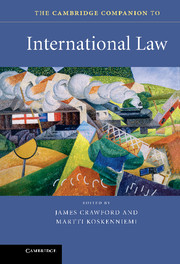Book contents
- Frontmatter
- Contents
- Preface
- Notes on contributors
- Introduction
- Part I The contexts of international law
- 1 International law in diplomatic history
- 2 International law in the world of ideas
- 3 International law as law
- Part II International law and the state
- Part III Techniques and arenas
- Part IV Projects of international law
- Guide to electronic sources of international law
- International law chronology
- Select guide to further reading
- Index
- References
2 - International law in the world of ideas
from Part I - The contexts of international law
Published online by Cambridge University Press: 05 July 2015
- Frontmatter
- Contents
- Preface
- Notes on contributors
- Introduction
- Part I The contexts of international law
- 1 International law in diplomatic history
- 2 International law in the world of ideas
- 3 International law as law
- Part II International law and the state
- Part III Techniques and arenas
- Part IV Projects of international law
- Guide to electronic sources of international law
- International law chronology
- Select guide to further reading
- Index
- References
Summary
The relationship of ideas and practices
Of the different types of law taught at universities or practised in governments, commercial companies, or law firms, international law has always been the most open to moral or philosophical reflection. To engage in international law has been to involve oneself in contested ideas about legitimate government, justified forms of violence, universal rights and the direction of human progress. Ideas about the politically just and unjust are condensed in technical international law rules and institutions, giving them sharpness and actuality that has fed back as experience to the worlds of politics and thought. For example, occupation of territory, the movement of military forces or the rights of aliens are seldom discussed in fully abstract terms – without thinking of this occupation, that war, those people. Abstract legal debate and political engagement are almost always two sides of the same coin. Which is why themes such as ‘sovereignty’, ‘just war’ and the ‘right to trade and extract resources’ may be equally at home in philosophy departments, international courts, foreign ministries and political rallies. As a vocabulary and a practice, international law is deeply embedded in the creation of a global, economically and technologically driven culture. Leading ideas such as the ‘universal’ or the ‘humanitarian’ are used both to legitimise current developments and to challenge them. There are few international controversies where both sides would not regularly invoke international law in their favour.
- Type
- Chapter
- Information
- The Cambridge Companion to International Law , pp. 47 - 63Publisher: Cambridge University PressPrint publication year: 2012
References
- 8
- Cited by

